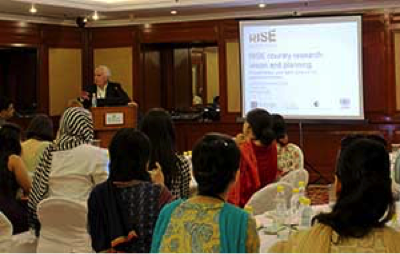Mari Oye
Research Assistant
Blog
“We know this is crazy ambitious,” Lant Pritchett says to introduce RISE: Research on Improving Systems of Education. We’re in a room full of 60 Indonesian researchers, and we just got off a redeye flight from Pakistan.
He’s right. The RISE program plans to study education systems reform in five countries over six years; CGD directs the research agenda. With a call for expressions of interest open until August 30, we’re traveling to spread the word to potential bidders. It’s been a busy couple weeks on a trip that took me to Dar es Salaam, Abuja, Delhi, Islamabad, and Jakarta so quickly my jetlag had whiplash.
“Everyone talks about improving education quality, but no one talks about how much or how quickly,” Pritchett says. At current rates of improvement, “it’s not your child, or your child’s child—it’s your child’s child’s child’s child who will live in a country where the typical child has access to quality education.” The room in Jakarta begins to buzz.
RISE is pushing for more. The point is to kick off a new approach to education systems research: starting with the “crazy ambitious” goal of getting developing countries to close the gap in learning quality, then studying what systems reforms could achieve it. Education research commonly starts out a different way, asking how much it helps to add one textbook, give one laptop, or slightly reduce class sizes. But a focus on inputs can obscure systemic problems.
In Nigeria, some local researchers said what matters is “not the amount of naira spent or the gigantic building, but how to ensure quality.”
Zaida Mgalla, head of the Uwezo community-led assessment in Tanzania, told me that when guests visit schools they ask “Do you have books?” Then the headmaster shows them “plenty of newly-bought books, locked away for years – because children are going to spill things on them!” The anecdote illustrates the problem of “system coherence,” creating systems aimed at producing learning, rather than the more logistically straightforward task of getting kids into school buildings and seated in rows visible to the state.
There’s definitely demand. As I drove back from the RISE meeting in Dar es Salaam, I passed a stall with the hand-lettered cardboard sign: “Education Is Better than Money.” As Justin Sandefur writes, though, the two are already tightly linked for households and for countries. So how can money spent on education translate into learning gains?
Ethiopian and Indonesian policymakers I met on this trip told me they look to the examples of Singapore, South Korea, and Finland. But improving education in developing countries won’t be a simple process of copying the trappings of success to match the way high-achieving countries look now (what Pritchett calls “isomorphic mimicry”). Instead, RISE is looking for the levers along the way which will push the system to coherently gather and recognize information, sustain a dynamic of innovation, develop accountability, and deliver learning.
We’re aiming for some crazy bold systems research.

Mari Oye is a Research Assistant with the Center for Global Development (CGD), working on the RISE Programme.
This blog first appeared on the CGD website on 18 August 2015.
RISE blog posts and podcasts reflect the views of the authors and do not necessarily represent the views of the organisation or our funders.